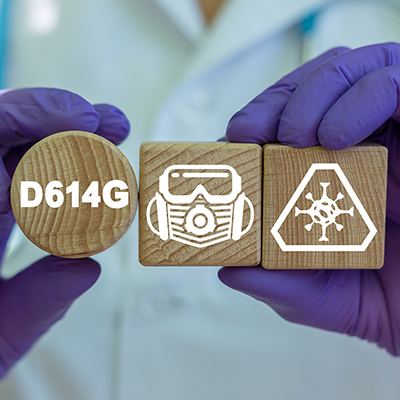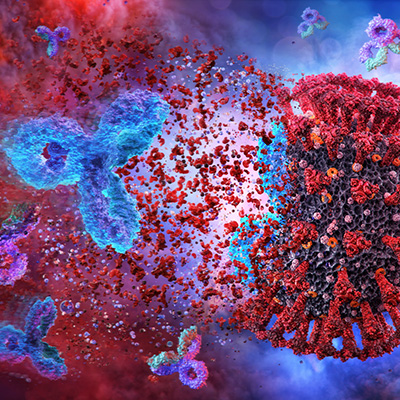November 13, 2020 -- A new study confirms that the D614G mutant SARS-CoV-2 virus, which is now the most common form of the virus, is more easily transmitted among hosts but does not cause more severe disease than the original virus. The findings were published in Science on November 12.
Pandemic spread of SARS-CoV-2 in naïve populations may result in mutations that alter the pathogenicity, virulence, and/or transmissibility of the virus. The recently emergent D614G substitution (aspartate-to-glycine change at position 614) in the spike glycoprotein of SARS-CoV-2 strains is now the most prevalent in the world.
Patients infected with this form of the virus have higher upper respiratory tract viral loads but not more severe disease. Structural analysis shows that the receptor-binding domains in the D614G form occupy a higher percentage in the open conformation, suggesting an improved ability to bind to the human receptor, angiotensin-converting enzyme 2 (ACE2). These experiments relied on a pseudotyped virus that included receptor-binding proteins that were not authentic. Therefore, the specifics of authentic D614G substitution in viral replication, pathogenesis, and transmissibility remain unclear.
To address this question, researchers from the University of North Carolina (UNC) at Chapel Hill and the University of Wisconsin-Madison generated an isogenic SARS-CoV-2 variation containing only the D614G substitution in the spike protein. They infected four susceptible cell lines with the variant and wildtype and measured entry events using a luciferase signal.
They found that the variant displayed enhanced infectivity. In experiments with primary epithelial cells, the D614G substitution enhanced replication fitness of the virus. Upon analyzing morphology and protein cleavage patterns, the researchers determined that the substitution is not different from the wildtype virus.
Specifically, the data indicate that the D614G variant has a significant advantage in epithelial cells in the nose and upper respiratory tract.
"The D614G virus outcompetes and outgrows the ancestral strain by about 10-fold and replicates extremely efficiently in primary nasal epithelial cells, which are a potentially important site for person-to-person transmission," said Ralph Baric, PhD, professor at the UNC-Chapel Hill Gillings School of Global Public Health and the UNC School of Medicine.
To evaluate the role of the D614G substitution in viral pathogenesis, hACE2 transgenic mice and Syrian hamsters were infected with equal amounts of wildtype or D614G viruses. Both groups of hamsters exhibited similar levels of viral titers, and similar severe pulmonary lesions.
However, they found that the D614G variant transmits significantly faster than the wildtype virus between hamsters. Hamsters exposed to the D614G virus saw transmission to 6 out of 8 hamsters within two days, and to all of the hamsters by day four. Comparatively, hamsters exposed to the wildtype virus had no transmission on day two, although all exposed hamsters were infected by day four. This suggests that while the mutated virus is much better at infecting hosts, it doesn't actually cause worse illness.
"We saw that the mutant virus transmits better airborne than the [original] virus, which may explain why this virus dominated in humans," said author Yoshihiro Kawaoka, virologist at the University of Wisconsin-Madison.
"SARS-CoV-2 is an entirely new human pathogen and its evolution in human populations is hard to predict," Baric said. "New variants are continually emerging, like the recently discovered mink SARS-CoV-2 cluster 5 variant in Denmark that also encodes D614G. To maximally protect public health, we must continue to track and understand the consequences of these new mutations on disease severity, transmission, host range and vulnerability to vaccine-induced immunity."
Do you have a unique perspective on your research related to virology or infectious disease research? Contact the editor today to learn more.
Copyright © 2020 scienceboard.net









